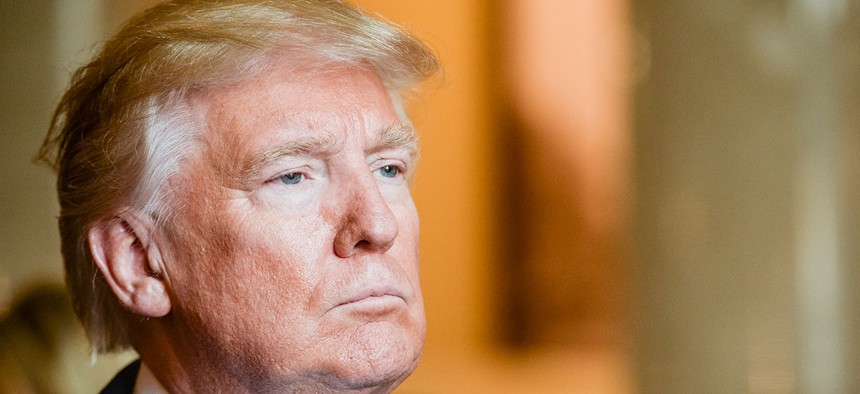
Sgt. Alicia Brand/Army
Trump Says He’ll Seek ‘Major Investigation Into Voter Fraud’
Trump’s claims of electoral fraud aren’t new. He made them repeatedly as a candidate when it appeared that Hillary Clinton would win the election
President-elect Donald Trump has repeatedly issued announcements and proposals over Twitter, during both the presidential election and the transition period, embracing the medium as a superior means of communicating with the American people compared to relying on traditional media organizations.
Incoming White House Press Secretary Sean Spicer has promised that Trump’s tweets will continue: “He has this direct pipeline to the American people, where he can talk back and forth,” Spicer recently explained to WPRI TV in Providence, Rhode Island, adding that Twitter allows him to “put his thoughts out and hear what they’re thinking in a way that no one’s ever been able to do before.”
I will be asking for a major investigation into VOTER FRAUD, including those registered to vote in two states, those who are illegal and....
— Donald J. Trump (@realDonaldTrump) January 25, 2017
even, those registered to vote who are dead (and many for a long time). Depending on results, we will strengthen up voting procedures!
— Donald J. Trump (@realDonaldTrump) January 25, 2017
The Prompt
Several news organizations on Tuesday reported that President Trump had told congressional leaders at a meeting Monday that he would have also won the popular vote in the presidential election but for widespread voter fraud. It’s not the first time Trump has questioned the integrity of the U.S. electoral system, though the assertion has been widely debunked even by members of his own party. When news organizations pressed Sean Spicer, the White House spokesman, on why Trump continued to perpetrate a lie, Spicer replied Tuesday: “I think the president has believed that for a while based on studies and information he has.”
The Context
Trump’s claims of electoral fraud aren’t new. He made them repeatedly as a candidate when it appeared that Hillary Clinton would win the election. And though he triumphed easily in the Electoral College (306-232), Trump lost the popular vote to Clinton by about 3 million votes. But when Jill Stein, the Green Party candidate, sought a recount in some states where Trump’s margin of victory was close, his legal team noted: “All available evidence suggests that the 2016 general election was not tainted by fraud/mistake.” Still, his loss in the popular vote appears to have rankled Trump, and he’s brought up the claim of widespread voter fraud repeatedly since then. In fact on November 27, soon after he was elected president, Trump tweeted he would have won the popular vote “if you deduct the millions of people who voted illegally.” Spicer on Tuesday said that Trump’s claims were based on a Pew study that, he said, showed 14 percent of those who voted were noncitizens; Spicer also cited “other studies that have been presented to him.” But as The New York Times notes, Trump appears to have conflated two separate studies: one that was criticized for flawed data; and the other in 2012, by the Pew Center on the States, which found, in the words of its author, David Becker, “millions of out of date registration records due to people moving or dying, but found no evidence that voter fraud resulted.” On Tuesday, Becker said: “As I've noted before, voting integrity better in this election than ever before. Zero evidence of fraud.”
The Response
Trump in his response notes that his inquiry will focus on “those registered to vote in two states, those who are illegal, and even, those registered to vote who are dead (and many for a long time).” This is a slight departure from his previous suggestion that voting by those in the country illegally cost him the popular vote. The Pew study noted that “approximately 2.75 million people have registrations in more than one state”; more than 1.8 million dead people were listed as voters. And while the Pew study didn’t have numbers on noncitizens voting, fact-check organization such as PoliticFact have said there’s no credible evidence that large numbers of noncitizens voted. A Trump-ordered inquiry, though there’s no indication one will materialize, could find some overlaps in voter registration and it may also find dead people on the rolls, but the numbers are likely to be inconsequential; nor is it completely knowable whether those people, if they voted, cast their ballots for Clinton or Trump.






